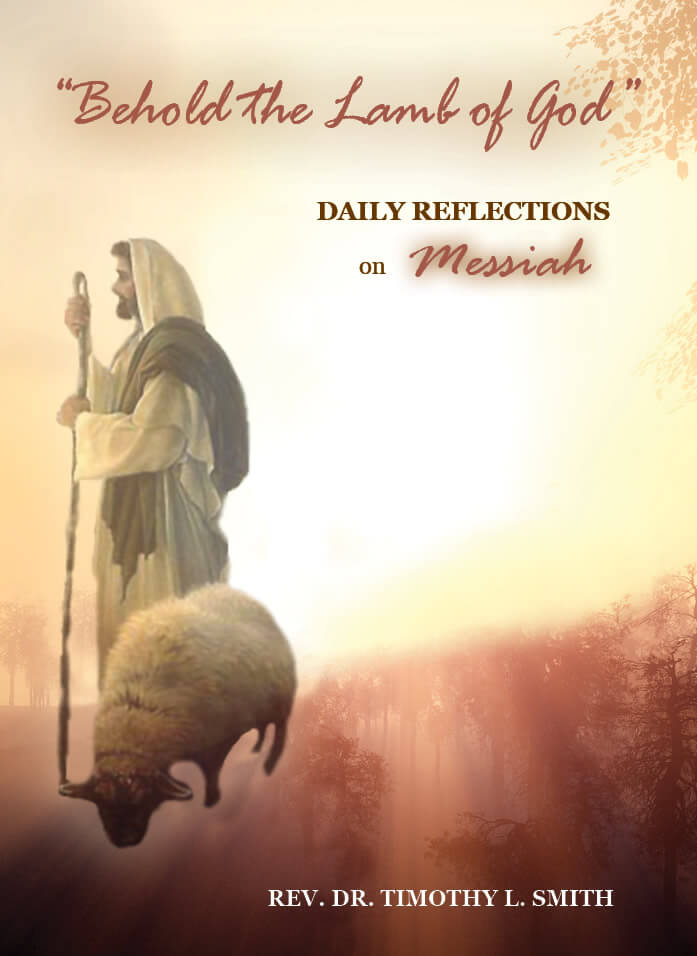As you read and reflect on today’s Holy Week devotional, please listen to this track from “Messiah”.
“I know that my Redeemer liveth, and that He shall stand at the latter day upon the earth. And though worms destroy this body, yet in my flesh I shall see God.”
Job 19:25-26
“For now is Christ risen from the dead, the first fruits of them that sleep.”
I Corinthians 15:20
TEXT

The Hebrew word translated “Redeemer” is go’el and refers to a close family member who steps forward to provide legal and financial protection for someone unable to defend himself (see Leviticus 25:23-25, 47-55; Num. 35:19-27; Ruth 4:4-15; 2 Sam. 14:11; 1 Kings 16:11; Ps. 119:154; Prov. 23:11; Jer. 50:34). The redeemer might act on behalf of a family member by buying back a field that a family member forfeited to debt (Leviticus 25:25, 26, 33; 27:13, 15), or by buying back a family member sold into slavery (Leviticus 25:48-49). Sometimes called the “kinsman-redeemer”, he pays a price to buy back that which has been lost.
It is significant that the word redeemer is also used of God as He redeems His people out of the slavery of Egypt (Exodus 6:6), or redeems them out of the bondage of Babylon (Isaiah 43:1, 14; 44:6,24; 47:4; 48:17). God is repeatedly seen as redeeming His people. He redeems His people from the “Pit” of death (Psalm 103:4), and rescues those who cry out to Him for help (Psalm 119:54).
Amid desolation Job knew one thing: that beyond the heavens he had a Redeemer who would act on his behalf to redeem his life. The Gospels reveal the Redeemer as Jesus. The Son of God took human form to become our closest kin so that He might pay our redemption. He became bone of our bone and flesh of our flesh and paid the redemption price.
The early Christians went forth boldly proclaiming Jesus as the Kinsman-Redeemer and His death as God’s sacrificial Lamb: “For as much as ye know that ye were not redeemed with corruptible things, as silver and gold, from your vain conversation received by tradition from your fathers; But with the precious blood of Christ, as of a lamb without blemish and without spot” (I Peter 1:18-19).
Like Job, even in our darkest nights we can “know” this one thing: that in Jesus we have a Kinsman-Redeemer. Our Redeemer has passed through death into resurrection life to save us from the powers of death and destruction. We can “know” that death will not have the last word! In our “flesh”, that is, in our bodies, we “shall see God”.
Job’s confession of faith is linked in Messiah to the Apostle Paul’s confident declaration of the resurrection: “For now is Christ risen from the dead, the first fruits of them that sleep.” Paul connects the resurrection of Jesus with our own future resurrection. The term “first fruits” is taken from the Passover celebration and the sacrifice of the lamb. According to Old Testament Law the Feast of First Fruits was to be observed the day after the Sabbath (Saturday) following Passover, which in this case would have been Easter Sunday (Leviticus 23:5-11; Luke 24:1). The Law required every farmer to dedicate in the temple the first bundle of the grain harvest in thankful anticipation of the coming full harvest.
So Paul sees in Jesus’ resurrection, which happened on the Feast of First Fruits, God’s assurance of the full harvest: the resurrection of all who believe. Along with Job we can “know” that we will be raised from the dead just as our Redeemer was raised triumphant. In our flesh we shall see God.
MUSIC
The violins open with a gentle, calm, yet assured statement of faith in the Redeemer, His resurrection and our own. They are joined by a lone soprano voice confidently confessing her faith in the Redeemer’s triumph. As a personal confession of faith this piece is sung by a soloist rather than a chorus. Amidst all the struggles and heartaches of this life, the soloist is sure of this one thing: “I know that my Redeemer liveth”.
As Handel does throughout Messiah, he uses musical notes to paint an acoustic picture of the Scripture text: we are being raised up with Messiah. So the music soars high from the key of D, which ended part II, to the key of E, rising even higher. The high soprano is taking us upward into the resurrection life of our Redeemer. The music line raises us with Him. Here is serene confidence in the resurrection of our bodies.
The thought that worms destroy the body only increases the soloist’s calm assurance about the future. Her voice grows in a quiet, yet bold assurance that in her flesh she shall see God. Again and again she comes back to that which she knows for sure: “I know that my Redeemer liveth”. The solo resolves quietly, taking us into eternal rest.
George Frederic Handel is buried in Westminster Abbey in London. A life-size statue erected there shows him holding the manuscript for this solo, “I know that my Redeemer liveth”.
PRAYING MESSIAH
- What do you sense that God might be saying to you in today’s Scripture text and music from Messiah?
- What do you want to say to God?
- Now take a few moments to be still in God’s presence.



